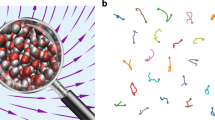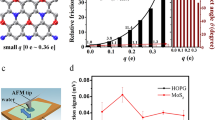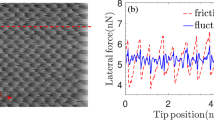Abstract
FRICTION between surfaces is normally either of the (a) continuous or (b) stick-slip type. Occasionally, however, as in the determination of the viscosity of ammonium oleate solution by means of the concentric cylinder method, a new type (c) is encountered provided the shearing-rate is sufficiently low. In this, chain-like micelles cause adhesion between the surfaces, this adhesion being then periodically broken down with violent movements.
This is a preview of subscription content, access via your institution
Access options
Subscribe to this journal
Receive 51 print issues and online access
$199.00 per year
only $3.90 per issue
Buy this article
- Purchase on Springer Link
- Instant access to full article PDF
Prices may be subject to local taxes which are calculated during checkout
Similar content being viewed by others
References
Clark, R. E. D., J. Soc. Chem. Ind., 59, 216 (1940).
Alexander, A. E., Proc. Roy. Soc., 179, A, 470 (1942).
Hatschek, E., Proc. Roy. Inst., 25, 251 (1927).
Pauling, L., “The Nature of the Chemical Bond” (1939).
Author information
Authors and Affiliations
Rights and permissions
About this article
Cite this article
CLARK, R. Long-Chain Molecules in Aqueous Urea Solution. Nature 151, 642–643 (1943). https://doi.org/10.1038/151642b0
Issue Date:
DOI: https://doi.org/10.1038/151642b0
This article is cited by
-
Viscosity of Concentrated Urea?Lithium Bromide Solutions
Nature (1960)
Comments
By submitting a comment you agree to abide by our Terms and Community Guidelines. If you find something abusive or that does not comply with our terms or guidelines please flag it as inappropriate.



